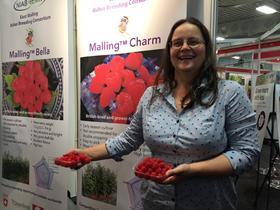
A raspberry breeding consortium designed to give independent growers access to cutting edge varieties has launched its first two cultivars.
Malling Charm and Malling Bella, which have been trialled over the past seven and nine years respectively, were unveiled by the East Malling Rubus Breeding Consortium at the National Fruit Show in Kent.
Malling Charm is an early primocane variety with large berries that are sweet and juicy and have a long shelf life.
Malling Bella, meanwhile, is a mid-season primocane that is well adapted to production in the UK and southern Europe. It is suitable for double cropping and long cane production and has large mid-red berries.
NIAB EMR, which bred the new varieties, reported positive feedback from Sainsbury’s, Morrisons and Tesco, saying “nothing indicates that any of them will have any problem listing it”.
“It’s likely it will go to every retailer that our growers supply,” said breeder Feli Fernández.
At present the new cultivars are being grown by just two growers: Kent grower Chambers and Spanish producer Onuba Fruit, both of whom are members of the consortium alongside breeding company NIAB EMR, Swiss nursery Lubera and Australian marketing firm Perfection Fresh.
For the time being, production is limited to members of the group, but applications for membership are being considered until April 2018.
Speaking about the raison d’être of the consortium, which was established in 2015, Fernández said: “The raspberry market has been very dominated by club varieties and we’re trying to give growers a different option than having to be tied to a particular propagator or marketing desk.
“The consortium gives an opportunity to independent growers to have access to state-of-art varieties, and that’s a big difference in the way we operate.”
Upbeat about the group’s first launches, Fernández said Bella was a more conventional raspberry type, describing it as “robust industrial variety”.
“It produces long canes so you can get a spring and an autumn crop from the same variety,” she said. “It will crop well; the canes are vigorous; it has a very traditional raspberry flavour.”
Malling Charm, on the other hand, is what has now become less common – a conventional primocane variety. It comes into production in mid-August, covering the gap in the market until mid to late September.
In terms of flavour, Charm is slightly sweeter, with a less complex palate, according to Fernández. But she said it would be “very valuable” for the industry to have a new variety at a time when the market is filled with imports or long cane production of summer-fruiting varieties that have to be kept in coldstores through the early summer.
“The environmental impact and the logistics of doing that is not insignificant,” she said. “In terms of long-term sustainability, Charm is a really positive contribution to the industry.”



